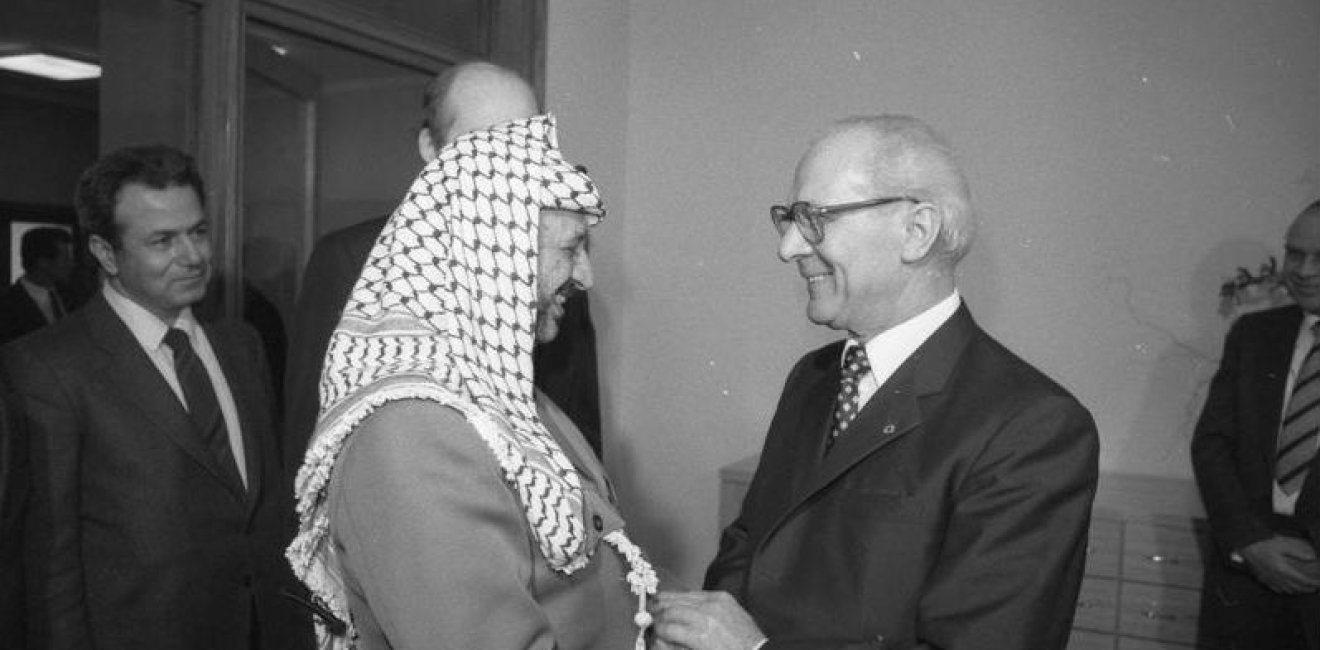East Germany's Eurocentric Definition of Counterterrorism
Documents from East German archives explains the complex relationship between the Stasi and the PLO.

A blog of the History and Public Policy Program
Documents from East German archives explains the complex relationship between the Stasi and the PLO.

The question of what role the Soviet Union and its satellites in Eastern Europe played in supporting international terrorism between the 1960s and 1989 became a significant one in the last decades of the Cold War. The files of East Germany’s Ministry of State Security, especially its division devoted to counterterrorism (Terrorabwehr) reveal an interesting and complex twist on this familiar topic. In the years following German unification in 1990, the files of the ruling Politburo, Foreign Ministry, Defense Ministry, Council of Ministers and the Ministry of State Security (the Stasi) of the East German Communist regime, known officially as the German Democratic Republic, or GDR became available to historians and other researchers. The Stasi files aroused considerable interest both within Germany and internationally for the light they shed on the domestic surveillance and repression of dissent and destruction of private life under the old regime.
Yet the files gathered in the Federal Commissioner for the Records of the State Security Services of the former GDR in Berlin, including but by no means limited to the Counterterrorism Division, are crucial for research on East German and Soviet bloc foreign, security, and intelligence policy. In the writing of my Undeclared Wars with Israel: East Germany and the West German Far Left, 1967-1989 (Cambridge University Press, 2016), I read them along with the files of the East German Foreign Ministry, in the Political Archive of the German Foreign Office in Berlin; the Politburo and Council of Minister Files in the German Federal Archive in Lichterfelde, Berlin; and those of the East German Ministry of National Defense in the German Federal Military Archiv in Freiburg. One result of the research was to examine what I called East Germany’s "Eurocentric" definition of counterterrorism.
I go into considerably more detail in my book, Undeclared Wars with Israel, but the gist of my argument is as follows:
In August 1973, East Germany became the first member of the Warsaw Pact to agree to allow the Palestine Liberation Organization (PLO) to open an office in its capital city. American diplomats worried that the PLO office would become a source for terrorist attacks in West Berlin, West Germany, and Western Europe. In late September, US Secretary of State Henry Kissinger informed the Soviet Union that the Western allies had heard that among the activities of the PLO office in East Berlin “will be the training of personnel for acts of terrorism.” Kissinger wrote that:
It is also in the Soviet interest to do nothing which might encourage terrorism or lead those who are inclined in that direction to believe they have the support—tacit or active—of authorities anywhere in Berlin. It is in this spirit that we ask that the Soviet Embassy to use its influence to keep the PLO office from operating.
Eager to preserve détente and the economic benefits it was bringing to the Soviet bloc, the Soviet and East German regimes and intelligence services took the American warning about terrorism directed at Western Europe very seriously.
The opening of the PLO office in East Berlin created a dilemma for the East German regime. At that time, the PLO’s public position was to wage war, or “armed struggle,” against the state of Israel. Some organizations associated with the PLO had participated in the attack on Israeli athletes in the Munich Olympics in 1972 and in numerous airplane hijackings of European airlines in the previous several years. How then, especially in view of the American warning, could East Germany support terrorist organizations such as the PLO without undermining support for détente in Western Europe?
A report by the Stasi of October 17, 1973 expressed concern about “possible execution of acts of terror by militant organizations originating from the [East German] base of operations and possible activities of supporters living in the GDR.” Stasi officials ordered expanded surveillance of the PLO office as it “could itself be the starting point of activities that would do political damage to the GDR.” The Stasi memo expressed an enduring ambivalence toward the Arab and Palestinian political figures living and studying in East Germany. On the one hand, the Communist regime welcomed them as part of its contribution to the Communists global battle against Western powers and Israel. On the other, it viewed them as a source of trouble especially if they carried out terrorist attacks in West Germany and Western Europe that could be traced back to East Germany. Such actions would undermine the GDR’s reputation as a “peace state,” confirm suspicions that it was a state sponsor of terrorism and could thus endanger the financially lucrative benefits of détente it was receiving from West Germany.
These concerns were the beginnings of East Germany’s Eurocentric definition of counterterrorism. It began with a remarkable Stasi report ordered by Minister Erich Mielke of May 8, 1979, entitled “Information about Activities of Representatives of the Palestine Liberation Movement in Association with International Terrorists Seeking to Include the GDR in the Preparation of Acts of Violence in the Countries of Western Europe.” The memo read in part:
Groups within the Palestinian liberation movement in association with anarcho-terrorist groups have intensified their efforts to use the territory of the GDR as a logistical base and starting point for the implementation of acts of violence in Western Europe…Such activities that are based in the territory of the GDR create political dangers and damage our national security interests.
The origins of East Germany’s close cooperation with the PLO’s intelligence service lay in the Stasi’s effort to reconcile support for armed Palestinian organizations attacking Israel with preventing some of those same organizations from carrying out attacks in West Germany that could be traced back to East Germany.
Fortunately for the Stasi, in Yasser Arafat and the PLO, East Germany had an ally deeply familiar with the Arab and Palestinian organizations engaged in terrorism directed against Israel and Western Europe. Arafat appeared to have concluded that terrorist attacks in Western Europe did more harm than good to the PLO’s goal of winning political support there in its battle against Israel. Hence, in exchange for the support the PLO was receiving from the Soviet bloc (including from East Germany) for its armed attacks on Israel, the PLO was willing to assist the East German regime in reducing the terrorist threat to West Germany and Western Europe if that threat came from foreign groups and individuals working in East Germany or other Soviet bloc states. A joint effort to prevent what the Stasi referred to as “extremists” from using East Germany or Soviet bloc countries to plan terrorist activities in Western Europe became grounds for intensified cooperation between the Stasi and the PLO.
The purpose of the cooperation was not, however, to discourage terrorism directed at Israel or at the Egyptian government of Anwar Sadat. On the contrary, as a Stasi memo of May 8, 1979, put it, the goal was for “the GDR as its ally, to enhance the PLO’s ability to carry out actions that it describes as ‘acts of war’ (Kriegshandlungen) against anti-Palestinian, Zionist centers as well as against the traitorous Sadat regime.”
In June 1979, East Germany’s Ministry of State Security signed a formal agreement of cooperation with the PLO intelligence services based on their shared interest in preventing the use of East Germany as a base for terrorist operations against Western Europe but in fostering it as a base for terrorist operations against Israel. The contact between the two services was made by Gerhard Neiber’s Counterterrorism Department XXII. It was in the mid-1970s when East Germany and the Soviet bloc were arming and training the various organizations of the PLO that those organizations carried out frequent attacks on civilians in the towns of northern Israel, such as those in Kiryat Shmona and Maalot in spring 1974 from their bases in southern Lebanon. East Germany’s “operation friendship,” namely the arming and training of the PLO and other “national liberation movements” continued up 1989. Undeclared Wars with Israel offers details about those programs gathered from the Stasi and the East German Council of Ministers and its Defense Ministry.
The collapse of the East German regime as well as of the Soviet Union and its East European satellites was an unmitigated disaster for the Palestine Liberation Organization as well as for the Arab states (Iraq, Libya, Yemen and Hafez al-Assad’s Syria). They all lost crucial sources of weapons, military training and political support. The Soviet bloc and East German support for terrorism was real and important, but only with access to the files of the former East German regime have we been able to understand the history and complexities of its Eurocentric dimension.


A leader in making key foreign policy records accessible and fostering informed scholarship, analysis, and discussion on international affairs, past and present. Read more


The Cold War International History Project supports the full and prompt release of historical materials by governments on all sides of the Cold War. Read more



